

 |
 |
||||
| Home | Reviews | Extras | Forums |
|
Evangelion 3.0: You Can (Not) RedoSynopsisFourteen years after the 3rd Impact, Misato Katsuragi and Ritsuko Akagi have broken off from NERV to form a rebel organization, WILLE, that opposes Gendo Ikari. Their fleet detects signs of life in the space pod in which Shinji Ikari, comatose, has been kept since that day; Mari and Asuka are sent out to obtain it, and in spite of a renewed Angel attack they manage to bring it back safely. Shinji awakens to find a world he does not remember: neither he nor any of the other EVA pilots have aged, for reasons nobody yet understands, and the world is now essentially ruined from the effects of the Impact. Those in WILLE shun him for bringing it about; they tell him that they will kill him if he ever again attempts to pilot the EVA. This is not to be, however, for the fleet is soon intercepted by an EVA that appears to be piloted by Rei, who had been thought to have disappeared and whom Shinji is now desperately looking for. Shinji finds himself rejoining this new "Rei," his father, and the mysterious Kaworu Nagisa, whom Gendo says will pilot a new EVA unit along with Shinji. This is much to the fear of Misato, who suspects that Gendo is engineering another impact event. ReviewWARNING: This review assumes basic familiarity with the previous "Rebuild of Evangelion" films and has spoilers for both of them. I've done my best to avoid spoilers for the original TV series, but for those who haven't seen it, it's impossible to talk about this movie without referencing it at all, so be aware of that. So, the Evangelion franchise has a long history, and here's where I stand on it, to give some context for this review. The original TV series was one of the first full-length anime series I ever saw, and it definitely played a role in me sticking around in anime fandom as long as I have; I do owe it a rewatch at this point, but my opinion of it has gone up, not down, over time, and I'll fully confess to being an unapologetic Evangelion fangirl. As for the previous two "Rebuild of Evangelion" movies, I have reviews of them here and here, but in short, I enjoyed the former for the streamlining and improved animation it brought and the latter for doing what, at the time, I felt was a better job of emotionally investing its audience in its story than did the TV series. Now, it's been several years since I wrote either of those reviews, and I've finally taken the time to watch and review the third film in 2016, several years after it came out. I had heard that the newest movie headed in a strange and very different direction from the previous two entries and had some apprehension about it given the reactions I'd come across. For one thing, not one of the scenes shown in the "preview" at the very end of You Can (Not) Advance is used here, which makes me think that the movie went through a good number of rewrites before any of us got to see it. Another thing, though, was that over the past few years, I thought about how much, in retrospect, I'd liked some of the character arcs from the original series, particular those of Asuka and of Kaji and Misato, that were sidestepped in "Rebuild," and that I realized that in spite of as frustrating as those characters could be, and as solid as the 1st and 2nd films had been, I'd missed the focus on them. But regardless of how I might feel about either the TV series or the previous "Rebuild" films upon an (overdue) rewatch, it's about time that I talk about this film now. In short, I liked it and enjoyed the new direction the series has taken, but I found it to be somewhat clunky in execution and felt that the time skip between You Can (Not) Advance and this film contributed to a disjointed continuity, with some of the doubts about the previous movies that I've just talked about being affirmed by it, also. 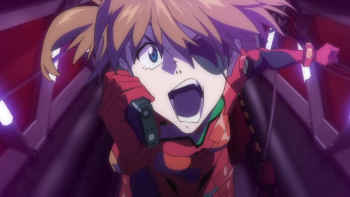 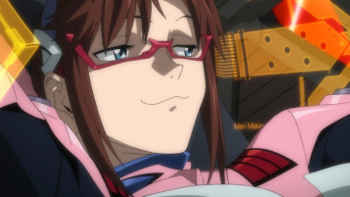 The last time I reviewed an Evangelion film, I laid out the scant negatives before launching into some full-blown fangirling; here, I'd like to start off with the aspects of the movie that I did truly enjoy, since for all of my reservations, there were plenty of them. For starters, the dynamic of a now almost entirely isolated Gendo Ikari facing off against a motley crew of rebels made of his former uneasy allies suits this franchise perfectly; Gendo is such a myopic and horrid egoist that to follow him, even if to do so is to achieve greatness, is to consign yourself to your own enslavement and destruction, and he has and has never had any true "compatriots." There was something moving to me about WILLE consisting of an apparently much more democratic and egalitarian power structure, with Misato and Ritsuko, now apparently freed of Gendo's influence, still fighting the angels off but also attempting to circumvent his machinations and those of SEELE and, thus far, doing so fairly well. The organization includes several new characters whose designs and personalities are an apparent nod to the crew of the Nautilus in Nadia, another old-school series of Hideaki Anno's whose popularity has been eclipsed by that of Evangelion, and indeed, the design and operation of WILLE's fleet struck me as an homage to that show, constituting a future for humanity that might not purely be at the whim of Gendo's egotistical genius. On the note of character designs, practically everybody besides the EVA pilots themselves (for the reasons I mentioned in the synopsis) gets a new look, both given their ages but, fittingly, also their new roles: Misato and Ritsuko get shorter hair, for one thing, and pull off the steampunk-ship captain look pretty darned well (though to be fair, I may just have a soft spot for space-opera costumes). The saddest aspect of this, perhaps, is seeing how much Fuyutsuki, Gendo's right hand man, has aged; he's practically the only person still standing by Gendo, with the heartbreaking aspect being that while he knows Gendo is completely twisted, he knows that he can do nothing besides stand by him given his past relationship with him and his now-deceased wife. I'll also say that You Can (Not) Redo pulls out some pretty great looking art and animation, some clunky CGI aside. The ruined, empty Tokyo 3 is a breathtaking and horrifying place to behold, with the cracked, desolate, and lifeless NERV base giving the impression of a dead, devastated kingdom with Gendo as its delusional, clinically insane king still sitting in its ruins. I've been lucky enough to visit Antarctica as a geologist, and the complete absence of plantlife there was one of the strangest aspects, albeit one whose weirdness crept up on me; that sticks out here, where compared to the somewhat crumbled but still-semi verdant world of the first film the bareness and starkness of these ruins give a subtle, striking impression of complete deadness after the results of the Third Impact. It's evident that not all of the world is completely ruined, given that WILLE has enough resources to function, but Japan itself is now essentially dead. With Shinji, "Rei," Kaworu, Gendo, and Fuyutsuki being the only people ever seen in NERV's headquarters, there's an element of them all having staked out a fragile existence in a dead world; what little still functions at NERV is automated, and the rare touches of civilization, such as Kaworu's piano sitting in the midst of the ruined courtyard, seem surreal and creepy more than anything. As depressing as I found it to look at, I loved the design and cinematography; I also enjoyed watching the Wunder and the ever-dynamic mecha battles of this franchise, and I thought it was a nice touch both artistically and thematically that the Wunder was powered by an old EVA unit. The music didn't stick out to me as much, this time, and I think that the first film may still take the cake on that front, but from what I remember, it worked just fine. 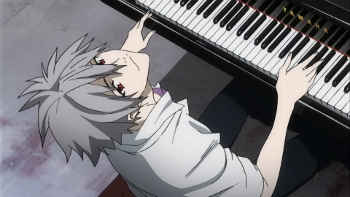 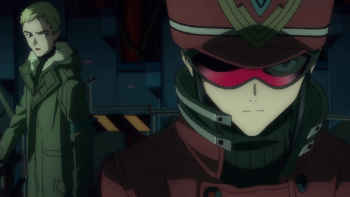 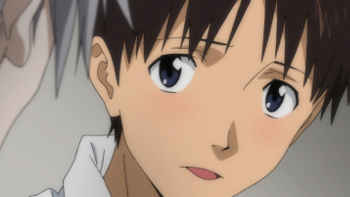 If you haven't picked up on this yet, You Can (Not) Redo is a profoundly depressing movie; while "depressing" and "dark" have basically been the hallmarks of this franchise from day one, You Can (Not) Advance hinted that at the very least, the actions of Shinji and the other characters, those at film's end in particular, might help them better move forward and carve their own fate. With the production staff apparently having decided to jettison any and all ideas suggested by the last movie's preview, Asuka's eyepatch aside, this movie takes the uplifting aspects of the end of the last movie and shoves it in our faces: to be frank, I was shocked by it. I'll admit to weeping when Shinji used the EVA to enter the Angel's core while trying to save Rei, and at seeing them embrace as the Third Impact initiated; to find that Shinji's actions did nothing to save Rei, as we almost immediately learn here, and only screwed over the rest of the world, made me want to cry in a different way, and it's one of several reasons I'm now inclined to give those previous two movies a second look. This entry frames Shinji's decision squarely in the realm of a well-intentioned but ill-advised decision, though of course he couldn't have known that Rei would simply vanish from existence, and it's really no surprise to me that Misato and the others treat him so coldly now. Shinji is an incredibly divisive character for the Evangelion fanbase and for anime fans in general, and while I'm in the camp that empathizes with him for what he does manage to do in spite of his crippling fears and severe social anxiety, I will put it out there thatYou Can (Not) Redo brings out Shinji at his weakest and most fearful. It's no surprise to me that this happens, given that the film's premise is of him coming out of a catatonic state, being shunned by those he had worked so hard to connect with, realizing that the person he'd sacrificed everything to save is simply gone, and having essentially no choice but to again go along with his father's machinations. Still, I want to put that warning out there. This aspect wasn't necessarily a negative for me, but what I do consider a negative is that You Can (Not) Redo, with an entirely new plot, strikes me as significantly more rushed than the previous two films. The relationship between Shinji and Kaworu suffers the most from this, for after cameos in the first two films we finally get to see him and Shinji meet, only for the dialogue to be frustratingly cryptic and for the movie to force them together in a far more artificial way than did the TV series during Kaworu's even briefer appearance. In both cases, he appears as an almost inhumanly calm and nurturing character who is the only person to offer Shinji anything resembling unconditional affection, given that his volatile relationships with Asuka, Misato, and Rei have all broken down in various ways; in this case, Kaworu's first appearance onscreen, being seen from above playing piano in a ruined courtyard, speaks to Shinji's infatuation with someone so mysterious and unlike anybody else he's had to deal with. Without spoiling too much, Kaworu's role, in both the TV and movie series, is that even outwardly unconditional love and affection may be a mask, which is the revelation that, in the TV series, spikes the infamously abstract ending episodes of soul-searching. In this movie, it's somewhat unclear where this will lead, given that I have few inklings about the upcoming film as I write this (and I've learned not to trust the previews). Either way, I did find Shinji's relationship with Kaworu to be thematically effective, but it suffered from being wordy and rushed. Part of this may simply be that the time skip makes for a very jarring transition. Given how much the film tries to jam in, there's a lot to explain in a short time, and the writers don't do the very best job of it. The fact that so much is told to Shinji while he is simply wandering around the Wunder and that the attack that leads to him ending back at NERV happens while he is on the bridge speaks to this, I think. Truly, there's a bit too much convenience at work given the fact that we hardly spend any time with Shinji being detained or held in the Wunder before this attack even occurs. Depressingly, meanwhile, we learn next to nothing about what's happened to most of the characters, and I have to admit that my previous comments about Misato and Ritsuko were based at least somewhat on speculation and on their personalities from the TV series (another instance in which I wonder if somebody who had never seen the original would follow this, at all). Kaji has disappeared without a trace and almost without mention, meaning that his and Misato's story is essentially absent from this series. Asuka, whom I've warmed to significantly over the years, is absolutely fabulous to watch in this movie, but the fact of the matter is that her story has been sidestepped; especially considering that we get virtually no explanation for how she recovered from the trauma seen in You Can (Not) Advance, I felt pretty cheated on that front. Mari remains an entertaining but enigmatic and underdeveloped figure, and the development we did see in Rei in the last movie is all gone now, given the premise. Most of the cast from the first two movies, many of whose roles had devolved to glorified cameos by the time of You Can (Not) Advance are simply that: gone and probably presumed deceased. On a brighter note, You Can (Not) Redo does feature the long-overdue appearance of an infamous ghost character from the original TV series; it's a minor plot element, but as a longtime fangirl, it did actually make me pretty happy. 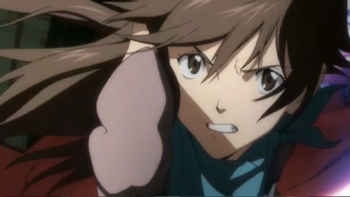 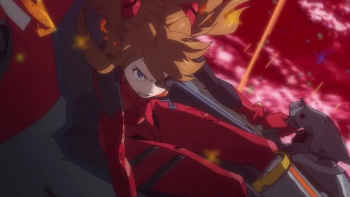 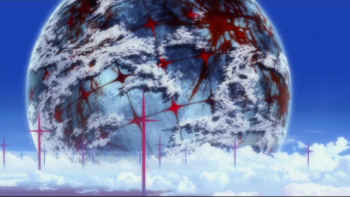 In short, I still enjoyed You Can (Not) Redo in spite of all my misgivings. Unlike the previous two films, I didn't enjoy it start-to-finish: it's too rushed, it's way too wordy, and it's often just too careless with some of its character arcs. But I did enjoy seeing this new vision of the post-Impact world and the themes brought along with that. The previous two films had reduced the exploration of the psychological and science fiction aspects of this universe somewhat, and as rushed as it could be this time, and as much as I know that these aspects have annoyed some anime fans, I rather enjoyed seeing them come back this time. I do warn, though, that down the line, my opinion of this movie may be shaken again by the appearance of the last entry; given that I know for a fact that I now owe the previous two movies a second viewing, and possibly new reviews as well, there's basically a 100% chance of that. Consider this review to be somewhat provisional, thus. A soft four stars and I have a lot of caveats: if Shinji drives you up the wall or if you thought that the original series had too much so-called technobabble, those aspects are far more noticeable here than in the earlier movies and you may have a hard time with it. It's also rushed and disappointing in the way it handles some of the character arcs. But it's a near-visual masterpiece and this, combined with my feelings about the series' new direction in regards to Shinji's personality and the geopolitics of this world, do give this movie a slight leg up for me. — Nicole MacLean Recommended Audience: Not for the squeamish and absolutely not for kids. It's the angels and the like that take the brunt of the violence, still, but one human character has his head blown off in graphic fashion. The series continues to promise "more fanservice next time" but there isn't much of that, aside from the homoerotic undertones between Shinji and Kaworu (if you have a problem with that, then promise me, we do not want to hear from you). Version(s) Viewed: R1 Blu-Ray, Japanese with English Subtitles Review Status: Full (1/1) Evangelion 3.0: You Can (Not) Redo © 2012 Studio Khara/Eva Production Committee |
 |
|
| © 1996-2015 THEM Anime Reviews. All rights reserved. |